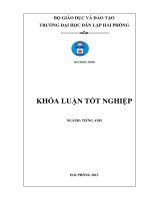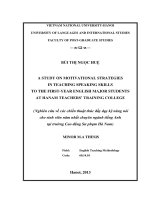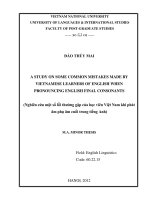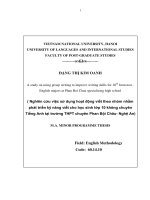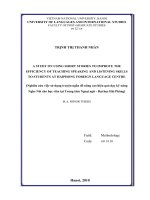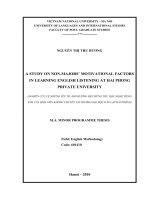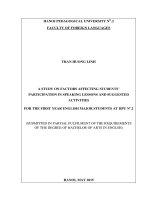A study on some educational games to motivate the first year english major students to improve the reading skill at hai phong private university
Bạn đang xem bản rút gọn của tài liệu. Xem và tải ngay bản đầy đủ của tài liệu tại đây (1.45 MB, 63 trang )
BỘ GIÁO DỤC VÀ ĐÀO TẠO
TRƯỜNG ĐẠI HỌC DÂN LẬP HẢI PHÒNG
-------------------------------
ISO 9001:2015
KHÓA LUẬN TỐT NGHIỆP
NGÀNH: NGÔN NGỮ ANH, NHẬT
Sinh viên
: Vũ Thị Liên
Giảng viên hướng dẫn: ThS. Phạm Thị Thúy
HẢI PHÒNG - 2019
BỘ GIÁO DỤC VÀ ĐÀO TẠO
TRƯỜNG ĐẠI HỌC DÂN LẬP HẢI PHÒNG
-----------------------------------
A STUDY ON SOME EDUCATIONAL GAMES TO
MOTIVATE THE FIRST YEAR ENGLISH MAJOR
STUDENTS TO IMPROVE THE READING SKILL AT HAI
PHONG PRIVATE UNIVERSITY
KHÓA LUẬN TỐT NGHIỆP ĐẠI HỌC HỆ CHÍNH QUY
NGÀNH: NGÔN NGỮ ANH, NHẬT
Sinh viên
: Vũ Thị Liên
Giảng viên hướng dẫn: THS. Phạm Thị Thúy
HẢI PHÒNG - 2019
BỘ GIÁO DỤC VÀ ĐÀO TẠO
TRƯỜNG ĐẠI HỌC DÂN LẬP HẢI PHÒNG
--------------------------------------
NHIỆM VỤ ĐỀ TÀI TỐT NGHIỆP
Sinh viên: Vũ Thị Liên
Mã SV:1512751002
Lớp: NA1902N
Ngành: Ngôn ngữ Anh , Nhật
Tên đề tài: A study on some educational games to motivate the
first year English major students to improve the reading skill
at Hai Phong Private University .
NHIỆM VỤ ĐỀ TÀI
1. Nội dung và các yêu cầu cần giải quyết trong nhiệm vụ đề tài tốt nghiệp
( về lý luận, thực tiễn, các số liệu cần tính toán và các bản vẽ).
……………………………………………………………………………..
……………………………………………………………………………..
……………………………………………………………………………..
……………………………………………………………………………..
……………………………………………………………………………..
……………………………………………………………………………..
……………………………………………………………………………..
……………………………………………………………………………..
2. Các số liệu cần thiết để thiết kế, tính toán.
……………………………………………………………………………..
……………………………………………………………………………..
……………………………………………………………………………..
……………………………………………………………………………..
……………………………………………………………………………..
……………………………………………………………………………..
……………………………………………………………………………..
……………………………………………………………………………..
……………………………………………………………………………..
3. Địa điểm thực tập tốt nghiệp.
……………………………………………………………………………..
……………………………………………………………………………..
……………………………………………………………………………..
CÁN BỘ HƯỚNG DẪN ĐỀ TÀI TỐT NGHIỆP
Người hướng dẫn thứ nhất:
Họ và tên: Phạm Thị Thúy
Học hàm, học vị: Thạc sĩ
Cơ quan công tác: Đại học Dân lập Hải Phòng
Nội dung hướng dẫn: A study on some educational games to motivate the
first year English major students to improve the reading skill at Hai Phong
Private University .
Người hướng dẫn thứ hai:
Họ và tên:.............................................................................................
Học hàm, học vị:...................................................................................
Cơ quan công tác:.................................................................................
Nội dung hướng dẫn:............................................................................
Đề tài tốt nghiệp được giao ngày … tháng ….. năm …..
Yêu cầu phải hoàn thành xong trước ngày …. tháng ….. năm ……
Đã nhận nhiệm vụ ĐTTN
Đã giao nhiệm vụ ĐTTN
Sinh viên
Người hướng dẫn
Vũ Thị Liên
ThS. Phạm Thị Thúy
Hải Phòng, ngày ...... tháng........năm 20..
Hiệu trưởng
GS.TS.NGƯT Trần Hữu Nghị
CỘNG HÒA XÃ HỘI CHỦ NGHĨA VIỆT NAM
Độc lập - Tự do - Hạnh phúc
PHIẾU NHẬN XÉT CỦA GIẢNG VIÊN HƯỚNG DẪN TỐT NGHIỆP
Họ và tên giảng viên:
...................................................................................................
Đơn vị công tác:
........................................................................ ..........................
Họ và tên sinh viên:
.......................................... Chuyên ngành: ...............................
Nội dung hướng dẫn:
.......................................................... ........................................
............................................................................................................................
........
1. Tinh thần thái độ của sinh viên trong quá trình làm đề tài tốt nghiệp
..............................................................................................................................................
....... ..............................................................................................................................................
....... ..............................................................................................................................................
....... ..............................................................................................................................................
....... ..............................................................................................................................................
....... ..............................................................................................................................................
2. Đánh giá chất lượng của đồ án/khóa luận (so với nội dung yêu cầu đã đề ra trong
nhiệm vụ Đ.T. T.N trên các mặt lý luận, thực tiễn, tính toán số liệu…)
....... ..............................................................................................................................................
....... ..............................................................................................................................................
....... ..............................................................................................................................................
....... ..............................................................................................................................................
....... ..............................................................................................................................................
....... ..............................................................................................................................................
....... ..............................................................................................................................................
3. Ý kiến của giảng viên hướng dẫn tốt nghiệp
Được bảo vệ
Không được bảo vệ
Điểm hướng dẫn
Hải Phòng, ngày … tháng … năm ......
Giảng viên hướng dẫn
(Ký và ghi rõ họ tên)
QC20-B18
CỘNG HÒA XÃ HỘI CHỦ NGHĨA VIỆT NAM
Độc lập - Tự do - Hạnh phúc
PHIẾU NHẬN XÉT CỦA GIẢNG VIÊN CHẤM PHẢN BIỆN
Họ và tên giảng viên:
..............................................................................................
Đơn vị công tác:
........................................................................ .....................
Họ và tên sinh viên:
...................................... Chuyên ngành: ..............................
Đề tài tốt nghiệp:
......................................................................... ....................
............................................................................................................................
............................................................................................................................
1. Phần nhận xét của giáo viên chấm phản biện
...... ..........................................................................................................................................
...... ..........................................................................................................................................
...... ..........................................................................................................................................
...... ..........................................................................................................................................
...... ..........................................................................................................................................
...... ..........................................................................................................................................
2. Những mặt còn hạn chế
...... ..........................................................................................................................................
...... ..........................................................................................................................................
...... ..........................................................................................................................................
...... ..........................................................................................................................................
...... ..........................................................................................................................................
...... ..........................................................................................................................................
3. Ý kiến của giảng viênchấm phản biện
Được bảo vệ
Không được bảo vệ
Điểm phản biện
Hải Phòng, ngày … tháng … năm ......
Giảng viênchấm phản biện
(Ký và ghi rõ họ tên)
QC20-B19
ACKNOWLEDGEMENTS
I am very grateful to Dr. Tran Thi Ngoc Lien, the Dean of Foreign
Languages Department and all of my beloved teachers whose helpful lectures on
the field of valuable knowledge have enlightened the arguments in this study.
I would like to express my deepest thanks to my supervisor, Pham Thi
Thuy, MA for her valuable guidance and encouragement she gave me
throughout my study. I used to have many dificultiies during my research but
my supervisor always stood by me and supported me.
I would like to express my sincere gratitude to Miss Nguyen Quynh Hoa,
MA from Foreign Language Department for her help and encouragement during
my completion of this study.
I would like to thank my friends at class NA1902N for their helps and
giving me motivation to complete this graduation paper.
I take this opportunity to express my indebtedness to my parents, my
siblings who have constantly inspired and encouraged me to complete this
research.
Finally, I wish to thank my readers for their interest and comments on this
study.
Hai Phong, September, 2019.
Vu Thi Lien
i
TABLE OF CONTENTS
ACKNOWLEDGEMENTS ...........................................................................................i
PART I: INTRODUCTION .........................................................................................1
PART II: DEVELOPMENT ........................................................................................5
CHAPTER 1: LITERATURE REVIEW ....................................................................5
1. Definition of reading skills ........................................................................................5
2. The purpose of reading skill .....................................................................................6
3. Educational games .....................................................................................................6
3.1. Introduction .............................................................................................................6
3.2. Definition Of Educational Games . ..........................................................................7
3.3. Types of the educational games ................................................................................8
3.4. Educational Games Significance ..............................................................................9
3.5. The pedagogical benefits of educational games : ..................................................10
3.6. Educational games in English language class ......................................................12
3.7. The significance of using games in English language class ..................................12
3.8. Advantages of using games in English language class ..........................................13
3.9. Language Games Selection Criteria .....................................................................15
3.10. When to use language game .................................................................................16
3.11. How to use language games in English language class ......................................17
CHAPTER 2: METHODOLOGY .............................................................................20
1.The reality of learning and teaching : ....................................................................20
1.1. Teachers..................................................................................................................20
1.2. Students: .................................................................................................................20
1.3. English teaching and learning condition at Haiphong Private .............................21
1.4. The teaching material:................................................................................................22
2. Data collection instrument ......................................................................................22
2.1. The design of the survey questionnaires .................................................................22
2.2. The data analysis: ...................................................................................................24
2.2.1. The result from the students’ English learning time: ..........................................24
2.2.2. The result from students’ attitude toward learning reading skill ........................25
2.2.3. The result from students’ perceived importance of reading skill ........................26
2.2.4. The result from students’ perceived difficulty of reading skill ............................27
2.2.5. The result from students’ impression on the English reading lessons ................28
2.2.6. The result from students’ opinions on the effectiveness of educational games on
motivating students ........................................................................................................29
2.2.7. The result from teachers’ frequency of using English games in class ..............30
ii
2.2.8. The result from students’ frequency of learning English reading skill with
games in class time ........................................................................................................31
2.2.9. The result from students’ opinions on the efectiveness of interesting activities 32
2.2.10. The result from students’ opinions on the current teaching method ................33
CHAPTER 3: SOME SUGGESTED EDUCATIONAL GAMES TO MOTIVATE
THE FIRST YEAR ENGLISH MAJORS AT HPU TO LEARN ENGLISH
READING SKILL .......................................................................................................35
1. Some interesting games to study English reading : ..............................................35
1.1 . The game promotes vocabulary learning : ..........................................................35
1.1.1. The word search game.........................................................................................35
1.1.2 “ 21 Days “ games ...............................................................................................35
1.1.3. “ Bubbles” games...............................................................................................36
1.1.4. “ Make a word ” games .....................................................................................37
1.1.5. “Professor Garfield: Reading Ring” .................................................................37
1.1.6. “Tropico 4” games ............................................................................................38
1.1.7. “Influent” Games ................................................................................................39
1.1.8. Challenging game. ...............................................................................................39
1.1.9 . Zigsaw reading game .........................................................................................40
1.1.10. Sentence Arranging game.................................................................................40
1.1.11.Weed- Read game ...............................................................................................41
1.2. The games to practice about skimming and scanning : .....................................42
1.2.1. Reading street ......................................................................................................42
1.2.2. Spreeder ...............................................................................................................42
1.2.3. Skimming & Scanning .......................................................................................43
1.2.4.Read , Answer and Compete Game ......................................................................43
2.Summary ...................................................................................................................44
PART III: CONCLUSION .........................................................................................45
1. Conclusion ................................................................................................................45
2. Limitations and recommendations for further studies ........................................46
APPENDIX 1.1: QUESTIONNAIRE FOR STUDENTS ........................................47
APPENDIX 1.2 : QUESTIONNAIRE FOR STUDENTS .......................................49
REFERENCES ............................................................................................................51
iii
PART I: INTRODUCTION
1. Rationale
Nowadays , English is an international language , and most young people are
learning this language with the hope of being able to communicate with people
in the world. Learning a new language is always a challenge for anyone. English
is considered as the second language that every young person in VietNam needs
to learn, thus learning English becomes more and more necessary. Learning
English is not just limited in memorizing vocabulary and grammar, but it is also
a process of training and improving listening, speaking, reading, and writing
skill. There is no denying that reading is one of the important skills in English
and gives a variety of benefits to us. Reading is the window of the world
because of the fact that people can get more knowledge and information from
books, magazines, newspapers, etc. It helps readers to discover new words and
phrases that they come across in everyday conversations. Many foreign
language students often regard reading as one of the most important goals in
learning process and social interaction because, first, reading is an indispensable
communication tool in a civilized society. Second, the reading materials
produced in any period of time in history is most influenced by social
background. Third, the developments over the period of the recorded history of
reading have led to two very different poles. In the process of teaching and
learning English as a foreign language in Vietnam in general, and at Haiphong
Private University (HPU) in particular, reading has always been paid a great
deal of attention from both teachers and students. Like many other universities
in Vietnam, English at HPU is learnt and taught in a non-native environment,
therefore, reading is not only considered as a means to gain knowledge but also
a means by which further study takes place. For the first-year English major
students although they have been learning English for at least several years, it is
still often difficult for them to understand text or a passage in English, since they
still lack of vocabulary, grammar, reading skills and poor background
knowledge. Besides, the teachers sometimes have to face with difficulties in
1
dealing with the students’ learning demand and newly introduced sources of
materials. In addition, teaching methods and teaching techniques in general, are
still below the international standard of education. Therefore, identifying the
methods to motivate students to learn English reading skill is necessary. It is
hoped that the study will make some contributions to improve learning English
in general, and reading in particular among the 1st year English majors at HPU.
The author also hopes that it will be possible to make useful suggestions for the
teachers to improve the situation of teaching and learning English reading at
HPU.
Due to the above mentioned , I have studied some English games with the
hope that they can help the first year English major students at Haiphong Private
University study English reading skill better in the near future . That is the
reason why I decide to choose the research with the title: A study on some
educational games to motivate the first year English major students to improve
the reading skill at Hai Phong Private University .
2. Aims of the study
The aim of this study is finding out helpful games for teaching reading
lessons which attract students’ attention to the lesson. The students will feel
interested, enjoyable and funny when they take part in the reading lesson and it's
helpful for students to improve their reading skill in which the study focuses on
finding the reality of the first year English majors’ learning English reading and
giving them the suggestions for better reading. The author wants to change the
students’ attitude on reading English and let them find English reading more
interesting. The expectation is that the first year English majors at HPU can
consider reading English as their favorite activity.
3. Scope of the study
The present study focuses on improving the first year English majors’
reading skill at HPU. In fact, there are lots of various techniques to study
English reading. It requires much of time and effort. However, due to the
limitation of time, resources and knowledge of mine as well as some other
2
conditions, this study was carried out to find out the reality of teaching English
reading for the first year English majors and offer some English games to help
the English majors at HPU enhance their reading skill. Thus, the result of study
is limited only to those students participating in this study and these findings
may impact the generalization to the larger population of all students and they
can also be the references for anyone who wants to practice English reading.
4. Research questions
In order to achieve the aforementioned aim, the researcher has set the
following specific question: To what extend do the educational games motivate
the first year English majors to improve reading skill?
5. Method of study
To complete this study, a variety of methods have been employed:
- Concemed materials including reference books on teaching methodology have
been carefully studied and analyzed.
- A survey questionnaire was conducted to the first year English majors at HPU
to find out their recognitions, attitudes of the matter and their expectations when
practicing English reading skill.
- Explore and refer to some useful games for learning English especially reading
skills
- In addition, to make the data collected more reliable and authentic, qualitative
method was applied with two instruments: an informal interview and
observation.
All the comments, remarks, recommendations and conclusion provided in the
study were based on the data analysis of the study.
6. Design of the study
This study consists of three parts:
Part I, Introduction, includes the rationale to the study. It also includes the
aims of the study, the research questions, the scope of the study. Next the design
of the study is also presented.
Part II, The development consists of three chapters:
3
Chapter 1, Literature review, presents a review of related literature that
provides the definition of reading skill, the purpose of reading skill and the
educational games with 11 contents: introduction, definition of educational
games, types of the educational games, educational games significance, the
pedagogical benefits of educational games, educational games in english
language class, the significance of using games in english language class,
advantages of using games in english language class, language games selection
criteria, when to use language game and how to use language games in english
language class
Chapter 2, Methodology, focuses on the reality of English learning and
teaching at HPU, the survey in which the objectives of the survey, the subjects,
and the methods of the study are studied. Chapter 2 also studies on the data
analysis , the findings and discussion of findings.
Chapter 3, Some suggested techniques in teaching English reading skill for
the first year English majors at HPU.
Part III, Conclusions in teaching reading English through educational games
are made; some limitations and suggestions for further research are stated. The
last are references, the appendixes that include all the documents relating to the
study.
4
PART II: DEVELOPMENT
CHAPTER 1: LITERATURE REVIEW
1. Definition of reading skills
"Reading" is the process of looking at a series of written symbols and getting
meaning from them. When we read, we use our eyes to receive written symbols
like letters, punctuation marks and spaces and we use our brain to convert them
into words, sentences and paragraphs that communicate something to us.
Reading can be silent in our head or aloud so that other people can hear.
Reading is a receptive skill - through it we receive information. But the complex
process of reading also requires the skill of speaking, so that we can pronounce
the words that we read. In this sense, reading is also a productive skill in that we
are both receiving information and transmitting it .
Reading skill refers to the ability to understand written text. It is advisable to
develop this skill at early age of schooling. When students comprehend or
understand written text, and combine their understanding with prior knowledge,
they are able to perform the following three reading-comprehension skills.
1. Identify simple facts presented in written text (literal comprehension)
2. Make judgments about the written text’s content (evaluative comprehension)
3. Connect the text to other written passages and situations (inferential
comprehension)
The development of these reading skills is vital to children’s development,
and a sheer volume of studies has demonstrated a link between competency in
reading and overall attainment in school . According to OCED’s report on
reading for change, program for international student assessment: “Reading for
pleasure is more important for children’s educational success than their family’s
socioeconomic status.” Besides, there are some other key benefits of engaging
children in reading from the early age. This is so because the development of
reading is a key to future success both in school and in life. By supporting
children to read in their leisure time at every age, parents can help to ensure that
children are equipped with the necessary skills to succeed in later life.
5
2. The purpose of reading skill
Reading is usually the priority topic to study in the aspect of the language.
There is no denying that reading is one of the important skills in English and
gives a variety of benefits to us. Reading is the window of the world because of
the fact that people can get more knowledge and information from books,
magazines, newspapers, etc. It helps readers to discover new words and phrases
that they come across in everyday conversations. Many foreign language
students often regard reading as one of the most important goals in learning
process and social interaction because, first, reading is an indispensable
communication tool in a civilized society. Second, the reading materials
produced in any period of time in history is most influenced by social
background. Third, reading activities are also a good indication of student’s
strength and weakness. Therefore, reading is considered to be a main means to
gain knowledge.
3. Educational games
3.1. Introduction
Different goals call for different strategies to be achieved . The time our
education goal is to build the learner as a whole , certain strategies away from
the traditional ones should be followed. Traditional methods based on the
teachers’ positivity and the learners’ negativity can not appeal to our education
goals nowadays . As result , new methods based on maximizing the learners’
active role in the teaching – Learning process have appeared (Mcllvain, 2004)
Cooperative learning , active learning , effective learning , task based
approach, group work, songs, projects and games are different strategies and
techniques have been adopted . The goal is the enhancement of the learners’
positivity, being the central factor of the teaching – learning process for better
learning outcomes .
Games as a teaching strategy has appeared as a reaction for two issues.
Firstly, the vast development in the educational literature as interest has been
shifted from the content as a goal in itself to the learner. The core of the teaching
6
– learning process has become the learner who is to practice positively a variety
of activities . Through these activities he would acquire the knowledge, the
concepts and the skills that enable him to practice life in his society . Secondly ,
the interest in the function of the information and its role in solving the society
problem .
Uberman (1998 ) indicates that using games has becomes a popular teaching
technique used by methodologists for its noticeable advantages . Moreover,
studies evidence that for language acquisition to happen , students need to
involve in a situation where there is no anxiety . Games provide the students
with
a learning situation that interests and encourage the development of
communication among the learners and bring about better learning outcomes
(Hyland , 1993 )
Due to the fact that the essence of many games lies in outstripping someone
else’s performance or in bettering one’s own , the goal is visible , outdoing
others and improving oneself in an enjoyable atmosphere . Lee(1979) claims
that game is a powerful instrument for teaching which promotes learning
through stimulating the leaners’ intrinsic motivation.
3.2. Definition Of Educational Games .
Hubbard(1991) indicates that games become an integral strategy for
teaching language . They no longer are entertainment activities but a stimulant
for practicing communication .
Crookal(1994) sees games as a tool for developing problem solving skills
and reinforcing the students’ language competence . In this section , different
definitions will be presented so that a comprehensive perception of what
educational games are may be achieved .
Coleman (1990 ) defines educational games as “ cooperative or competitivie
activities performed by the individuals to achieve certain goals within a set of
rules ”.
Hadfield (1990 ) defines games as “an activity with rules , a goal and an
element of fun ”.
7
Collier (1998) defines educational games as “ a kind of competition in
which players have objective such as winning or succeeding by having fun
under clear rules ”.
Hogle (1996 ) sees the educational games “as a contest of mental skills and
strengths that requires the participants to follow a specific set of rules in order to
attain a goal”.
Studying the previous definitions , one could deduce that educational
games are activities with some characteristics :
-They evoke excitement and pleasure .
- They have rules and limitations that should be followed .
-They are goal oriented activities .
-They stimulate and motivate students towards more positive interaction.
3.3. Types of the educational games
Al Rafi(2000) cites that educational games can be classified into three basic
categories :
A- Instructional games
They are instructional activities designed according to a set of rules that
organize the procedures of the game and the roles of the participants . Two or
more learners participate to achieve certain instructional objectives . The game
includes competition that ends in the winning of one team . These games don’t
initiate a life –link situation . Word game that aims at grasping the meaning of a
word or constructing a sentence is an example of this type .
B- Simulation
It is a life – link situation , where each learner has a specific role that
demands a problem solving or making a delicious . Role play and simulation
relate to this category .
C- Contests
They are interesting activities that include the discussion of certain topics .
These contests can be performed with a simulation or without . Lewis and
Bedson (1999 ) classify educational games into two categories:
8
A- The rousers
Games which wake a class up . They get the adrenalin going . Movement
games where there is an element of competition are typical arouser . Besides ,
guessing games that get students excited and the games that require students to
speak . These games could backfire , excite and make student wild and
sometimes lose control.
B- The settlers
The settlers on the other hand , calm the students down . Typical “ settlers ”
are craft activities and games which focus on listening . Writing games also tend
to settle the class , unless they are combined with other stirring elements . for
example running to the board . The difference between “rousers ” and “ settlers ”
is not always clear . It depends on how the teacher decides to play the game .
3.4. Educational Games Significance
Shaptoshvili (2002) asserts that games should be an essential part of the
teachers repertoire . Though they are recreational activities whose main purpose
is enjoyment , they have an evidence in the teaching- learning process .
Whatever we teach , whatever we hope the children are going to learn , the
experience is richer and more memorable when we engage the emotions , when
we include an element of fun , when we laugh ( Hearn , 2004 )
Al Hela ( 2002 ) , Essa and Masalha (2005:p.488) , Al Hwadi ( 2002 )
summarize the achieved doals og using educational games :
- Educational games are a learning tool
Educational games help the child discover and explore his surrounding
world . Through games , the child acquires a lots of information, facts and
concepts about people and things .
-Educational games are a tool for developing the cognitive competence
The game anticipates developing the child’s cognitive competence as a result
of understanding its rules . The child has to use his skills of analysis, innovation
and synthesis to play the game successfully .
9
- Educational games enhance the social and affective aspects of the child’s
character
Playing with others claims co-operation among all the practitioners . Games
accustom the child to communicate with others within group work .
Furthermore , they build the child’s emotional and affective balance . When the
child sacrifices his ego for others , he acquires some attitudes that facilitate his
adaptation to his environment .
- Educational games are a tool of compensation
Educational games help the child get rid of stress and repression . In some
assimilation games , the child tries to regain balance through assimilating the
roles of the elders .
- Educational games are a tool of expression
Games constitute a great means of communication that surpasses language .
Children can express their emotions , ideas interests , tendencies and aptitudes
through games .
3.5. The pedagogical benefits of educational games :
Games constitute a wonderful tool for engaging learners and reinforcing
their learning if they are used appropriately . This is a fact that no educator can
dispute or argue. The benefits of games as a teaching tool is noticeable as many
researchers have proposed many . These benefits touch almost all the aspects of
the students’s character. ( Hogle , 1996 )
1. Affective benefits
- Educational games are a demand for lowering the students’ affective fitter
and eliminating any psychological barriers towards the effective learning.
- Educational games provide the students with a special atmosphere full of
attraction, competition, luck and excitement which reflects on their
motivation. They promore the students’ intrinsic motivation which keeps
them attentive the lesson .
10
- Educational games not only provide the learners with the opportunity to
express their needs , desires and tendencies but stimulate their readiness
and aptitudes towards learning.
- Educational games affects their positive interaction and involvement .
- Educational games prevent boredom and develop a sense of achievement
which results in self-confidence and independence .
2. Mental benefits
- Educational games being free and fun activities stimulate the students’
energy towards a meaningful learning as many games can be geared
towards self- learning .
- Educational games create a state of doubt and disequilibrium which is
essential for recognition . This state drives the student to search ,
discover ,analyze and evaluate to regain the state of equilibrium .
- Educational games enhance students’ reasoning skills and high order
thinking . The student in the game is a creative thinker and a decision
marker. Through games students become better problem solvers as they
continue developing strategies and techniques to achieve their goals.
- Educational games develop students’ skills of observation , analysis ,
classification , deduction and synthesis .
3. Pedagogical benefits
In this aspect , educational games play a basic role in the teaching – learning
process which bring about remarkable results in the students’ school
achievement .
- Educational games change the traditional role of both , the teacher to be a
guide ,a supporter and a facilitator and the learner to be a researcher and
an active participant .
- Educational games individualize and organize learning to meet individual
differences . Different games meet different learning styles , auditory,
visual and Kinetic.
11
- Educational games promote intrapersonal reward structures for learning .
Besides they produce effective classroom interaction .
- Educational games enhance students’ competence of communication as
they enhance their language .
- Educational games shift the classroom mood from a deadly boring mood
into an interesting one .
4. Social benefits
- Educational games reinforce cooperation habits and the spirit of team
among students .
- Educational games promote healthy competition .
- Educational games develop students morals like , tolerance , co- operation,
respect and the acceptance of the other.
- Educational games build whole class participation .
- Educational games help students to assimilate some future roles .
- Educational games provide students with life- like experience ,
accordingly they bridge the gap between the class and their real life.
3.6. Educational games in English language class
Educational games play a fundamental role in the lives of students . They
tend to see life in terms of games and anything else is seen as something they
“ have to ”
rather than “want to ”do . If play and learning could be integrated , English will
become an important part of the students’ daily reality. Adding games to the
English languages classroom will vary the lesson and motivate students.
Through games, English becomes less frightening and immediately useful for
students. ( Mclaughlin ,2004 ).
3.7. The significance of using games in English language class
Bacha (2002) asserts that games have the potential to lower social and
emotional constraints and pressures that interfere with effective learning .
Games spark intrinsic motivation which raises students natural curiosity and
interests that promote learning . Educators believe that learning intrinsically
12
achieves superior understanding of the material being learned as well as
promotes long- term retention of language .
Educational games are very significant in English language class as they
create a non- threatening environment . Games stimulate the students to get
involved and participate actively in language learning activities . They also bring
real world context into the classroom and enhance students use of English in a
flexible communicative way .( Huyen & Nga ,2003 )
Recently , the concern of foreign language teachers is to make students use
the language communicatively . This orientation in teaching foreign language
gives the activities or techniques that are task-oriented importance and
significance . Games get this importance being a good instrument in enhancing
motivation ,and help students acquire language unconsciously . They create a
meaningful context for language us . The use of games increase cooperation and
competition . Thus , potential classroom ideas com into being and a
successful ,joyful and enthusiastic learning is provided. (Saricoban & Metin
2000 )
3.8. Advantages of using games in English language class
Though games are often associated with fun , we should not lose sight of
their pedagogical values , particularly in the foreign language teaching .
Learning a foreign language is not an easy task . Students have to face
unfamiliar or unknown grammatical structures , words and texts . Therefore ,
students often feel uncomfortable and insecure which inevitably affect their
learning . Games help students stop thinking about language and use it
spontaneously without realizing they are learning ( Deesri ,2002 )
Many researchers and educators point out a lot of advantages of using
games in English languages class . Kim (1995) points out that the educational
games students help students acquire English unconsciously within an enjoyable
and rewarding environment . They foster students to practice English using
different skills . Through well –planned games learners can practice vocabulary
and structures extensively .(Saricoban &Metin ,2000 )
13
- Students practice English in a vivid and meaningful context ( Lengeling &
Malarcher ,1997 ) thus , promote their communication competence .
( Chen , 2005 )
- Educational games develop students’ fluency , accuracy and ability to
improvise . They maximize students’ meaningful use of English in a
creative way ( Langran &Purcell, 1994 )
- Educational games help students practice English for purpose in a life –
like situations ( Atake ,2003 )
- In English language class , educational games motivate and loosen the
barriers to allow all students to practice English without any restrictions .
Even low achievers and shy students can practice English without being
afraid. ( Atake ,2003 )
- They are good option to increase students’ involvement and keep their
attention .
- Educational games are an affective tool to lower the students’ stress and
drive them in a natural real communication using English .
- They also maintain interest and create a student class centered where
students dominate the scence . ( Lengeling and Malarcher ,1997 )
- Educational games are highly appreciated thanks to their amusement.
Uberman (1998 ) highlight the use of games as they offer students a funfilled and relaxing atmosphere , so they encourage , entertain , teach and
promote fluency . They are highly motivating and entertaining and add
diversion to the regular classroom activities .
Huyen and Nga (2003) believe that games help students learn and retain
new words more easily . They enhance students’ competencies of using English
in a flexible and a communicative way .
To sum up , educational games are an essential and vital instrument that help
students acquire English unconsciously within a healthy competitive or cooperative atmosphere .
14
3.9. Language Games Selection Criteria
Deesri (2002) indicates that there is a great number of language games , so
teachers have variety of choices . However , in deciding which game to use in a
particular class , teachers should take many factors into account . They should
be very careful about choosing games if they want to make them profitable for
the learning process .( Uberman , 1998 )
The more careful the teachers are in choosing the games , the more effective
and fruitful the game is .( Atake ,2003 ) This process is not as simple as it
seems . Care should be given to the selection so that the success of a game is
inevitable ( Lengeling &Malarcher ,1997 )
Hogle (1996) refers that good games are fun ,intrinsically motivating and
offer the right amount of challenge . Furthermore , games should be cognitive
tools that reduce the need for laborious activity and drive students to achieve the
target goals . They should provide intensive practice of the language .
Huyen & Nga (2003 ) point out that space , students’ level ,age and culture ,
context , timing and classroom setting are basic factors to be considered .
Al Rafi ( 2000 ) asserts that authenticity , adequacy to the learning
objectives , expense , simplicity , classroom setting and students’ age are
important factors . The game should also fit the purpose of the lesson , the
content and the students’ characteristics along with providing students with both
fun and educational meaning . ( Deesri ,2002 )
Uberman (1998 ) and Lengeling and Malarcher ( 1997 ) state that
appropriateness is an essential factor to consider . Appropriateness means that
the game is appropriate to the content and the setting . Another factor influence
the choice of game is its length and the time necessary for its completion .
Sabreeni and Ghazawi ( 1987 ) & Mclaughlin (2004 ) summarize the game
selection criteria in the following :
1- The game should present reality . It should enhance skills students need in
the future .
2- The game should be the best way to achieve the target objectives
15
